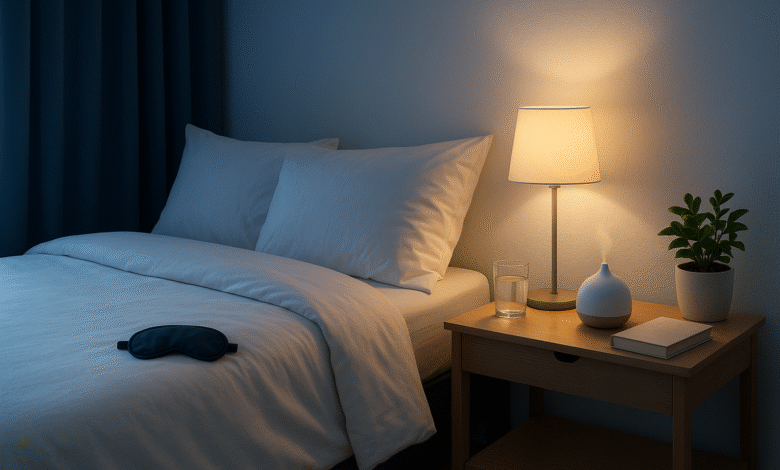Sleep Quality Improvement: Science-Backed Strategies
Discover science-backed sleep quality improvement strategies. Learn proven techniques for better rest, optimal sleep environment & natural remedies.

Getting good sleep isn’t just about spending eight hours in bed. Quality sleep can transform your health, mood, and daily performance. If you’re tired of tossing and turning or waking up feeling exhausted, you’re not alone. Millions of people struggle with poor sleep, but the good news is that sleep quality improvement is possible with the right strategies.
This comprehensive guide explores proven methods to enhance your sleep naturally. From simple bedroom changes to lifestyle adjustments, you’ll discover practical techniques that actually work.
EXPLORE THE CONTENTS
Why Sleep Quality Matters More Than Sleep Duration
Many people focus on getting enough hours of sleep, but sleep quality improvement involves much more than time spent in bed. Quality sleep means cycling through different sleep stages properly, including deep sleep and REM sleep.
During quality sleep, your body repairs tissues, consolidates memories, and releases important hormones. Poor sleep quality can lead to daytime fatigue, difficulty concentrating, mood swings, and long-term health problems like diabetes and heart disease.
Research shows that seven hours of high-quality sleep often feels more refreshing than nine hours of restless, interrupted sleep. This is why focusing on sleep quality improvement strategies can be more effective than simply going to bed earlier.
Creating the Perfect Sleep Environment
Your bedroom environment plays a huge role in sleep quality improvement. Small changes to your sleeping space can make a dramatic difference in how well you rest.
Temperature Control
The ideal bedroom temperature for quality sleep ranges between 60-67°F (15-19°C). Your body naturally drops its core temperature when preparing for sleep, and a cool room helps this process. If your room is too warm, your body struggles to reach the temperature needed for deep sleep.
Consider using a fan, adjusting your thermostat, or choosing lighter bedding during warmer months. Many people find that keeping their feet warm while maintaining a cool overall room temperature works best.
Darkness and Light Management
Darkness signals your brain to produce melatonin, the hormone that promotes sleepiness. Even small amounts of light can disrupt this process and harm sleep quality improvement efforts.
Install blackout curtains or use an eye mask to block outside light. Cover or remove electronic devices that emit light, including alarm clocks with bright displays. If you need some light for safety, use dim red lights, which are less likely to interfere with melatonin production.
Noise Reduction
Sudden noises can wake you up or prevent you from reaching deep sleep stages. While complete silence isn’t always possible, you can minimize disruptive sounds.
White noise machines, earplugs, or even a simple fan can help mask irregular sounds. If you live in a noisy area, consider soundproofing options like heavy curtains or rugs to absorb sound.
Comfortable Bedding
Your mattress, pillows, and sheets directly impact your comfort throughout the night. A mattress that’s too soft or too firm can cause discomfort and frequent position changes, disrupting sleep quality.
Replace your mattress every 7-10 years, or sooner if it shows signs of wear. Choose pillows that support your preferred sleeping position and replace them every 1-2 years. Breathable, natural fiber sheets can help regulate body temperature.
Optimizing Your Sleep Schedule
Consistency is key to sleep quality improvement. Your body thrives on routine, and irregular sleep patterns can confuse your internal clock, known as your circadian rhythm.
Establishing a Regular Bedtime
Going to bed at the same time each night, even on weekends, helps train your body to expect sleep. This consistency makes it easier to fall asleep and improves overall sleep quality.
Choose a bedtime that allows for 7-9 hours of sleep before your wake-up time. Stick to this schedule for at least two weeks to see improvements in your sleep patterns.
Creating a Pre-Sleep Routine
A relaxing bedtime routine signals to your body that it’s time to wind down. This routine should begin 30-60 minutes before your target bedtime.
Your routine might include activities like reading a book, taking a warm bath, gentle stretching, or listening to calm music. Avoid stimulating activities like intense exercise, work-related tasks, or emotional conversations.
Managing Weekend Sleep Patterns
While it’s tempting to sleep in on weekends, this can disrupt your sleep quality improvement efforts. Large variations in your sleep schedule can lead to “social jet lag,” making it harder to fall asleep on Sunday nights and wake up Monday mornings.
If you need to catch up on sleep, limit weekend sleep-ins to no more than one hour past your regular wake time. Instead of sleeping late, consider going to bed slightly earlier on Friday and Saturday nights.
Lifestyle Changes for Better Sleep
Your daily habits significantly impact your ability to achieve quality sleep. Making strategic lifestyle changes can dramatically improve your sleep without requiring medication or expensive treatments.
Exercise and Physical Activity
Regular exercise is one of the most effective sleep quality improvement strategies. Physical activity helps reduce stress, tire your body, and regulate your circadian rhythm.
Aim for at least 30 minutes of moderate exercise most days of the week. Morning or afternoon workouts are ideal, as exercising too close to bedtime can be stimulating. If you prefer evening workouts, finish at least 3-4 hours before bed.
Even light activities like walking or yoga can improve sleep quality. The key is consistency rather than intensity.
Stress Management Techniques
Stress and anxiety are major barriers to quality sleep. Racing thoughts, worry, and tension make it difficult to relax and fall asleep.
Practice stress reduction techniques like deep breathing, meditation, or progressive muscle relaxation. Even five minutes of these practices before bed can help calm your mind.
Keep a worry journal where you write down concerns before bedtime. This helps move anxious thoughts out of your head and onto paper, making it easier to let them go for the night.
Managing Screen Time
The blue light emitted by phones, tablets, computers, and TVs can interfere with melatonin production and disrupt sleep quality improvement efforts.
Stop using electronic devices at least one hour before bedtime. If you must use devices in the evening, consider blue light filtering glasses or apps that reduce blue light emission.
Replace evening screen time with relaxing activities like reading physical books, listening to podcasts, or gentle stretching.
Diet and Sleep Quality Connection
What you eat and drink throughout the day affects your sleep quality more than you might realize. Making smart dietary choices can significantly support your sleep quality improvement goals.
Foods That Promote Better Sleep
Certain foods contain nutrients that naturally promote relaxation and sleepiness. Tryptophan, found in turkey, milk, and bananas, helps produce serotonin and melatonin.
Magnesium-rich foods like almonds, spinach, and pumpkin seeds can help relax muscles and calm the nervous system. Complex carbohydrates from oats, quinoa, and sweet potatoes can help maintain stable blood sugar levels throughout the night.
Consider having a light snack 2-3 hours before bed if you’re hungry, but avoid large meals that can cause discomfort.
Avoiding Sleep Disruptors
Caffeine can stay in your system for 6-8 hours, so avoid coffee, tea, chocolate, and caffeine-containing sodas after 2 PM. Even if caffeine doesn’t prevent you from falling asleep, it can reduce deep sleep quality.
Alcohol might make you feel drowsy initially, but it disrupts sleep cycles and often causes middle-of-the-night awakenings. While an occasional drink is fine, avoid alcohol within 3-4 hours of bedtime.
Spicy foods, high-fat meals, and excessive fluids can cause discomfort or frequent bathroom trips that interrupt sleep.
Timing Your Meals
Eating large meals close to bedtime forces your body to focus on digestion when it should be preparing for sleep. Finish eating at least 2-3 hours before bed.
If you’re hungry before bed, choose a light snack that combines protein and complex carbohydrates, such as Greek yogurt with berries or whole grain toast with almond butter.
Understanding Sleep Disorders and When to Seek Help
Sometimes, despite your best sleep quality improvement efforts, underlying sleep disorders may be preventing restful sleep. Recognizing the signs can help you get appropriate treatment.
Common Sleep Disorders
Sleep apnea causes breathing interruptions during sleep, leading to frequent awakenings and poor sleep quality. Symptoms include loud snoring, gasping for air during sleep, and excessive daytime sleepiness.
Restless leg syndrome creates uncomfortable sensations in the legs and an urge to move them, especially when trying to fall asleep. This condition can significantly impact sleep quality improvement efforts.
Insomnia involves difficulty falling asleep, staying asleep, or waking up too early. Chronic insomnia lasting more than a month may require professional treatment.
When Professional Help is Needed
Consult a healthcare provider if you consistently experience poor sleep despite implementing multiple sleep quality improvement strategies for several weeks.
Red flags include loud snoring with breathing interruptions, excessive daytime sleepiness that interferes with daily activities, difficulty staying asleep most nights, or taking more than 30 minutes to fall asleep regularly.
A sleep specialist can conduct sleep studies and recommend appropriate treatments, which might include lifestyle changes, therapy, or medical interventions.
Natural Sleep Aids and Supplements
While lifestyle changes should be your first approach to sleep quality improvement, some natural aids can provide additional support when used appropriately.
Herbal Remedies
Chamomile tea has mild sedative properties and can help promote relaxation before bedtime. Drinking a cup 30-60 minutes before sleep may help some people feel calmer.
Valerian root is an herbal supplement that some people find helpful for falling asleep faster. However, it can take several weeks to show effects and may cause morning grogginess in some individuals.
Lavender essential oil, used in aromatherapy or added to a warm bath, can create a calming atmosphere that supports sleep quality improvement.
Melatonin Supplements
Melatonin supplements can be helpful for certain sleep issues, particularly when traveling across time zones or adjusting to shift work. However, timing and dosage are important.
Start with the lowest effective dose (0.5-3 mg) and take it 30 minutes to 2 hours before your desired bedtime. Using melatonin at the wrong time can actually worsen sleep problems.
Consult with a healthcare provider before starting any supplements, especially if you take other medications or have health conditions.
Building Long-Term Sleep Quality Improvement Habits
Sustainable sleep quality improvement requires patience and consistency. Changes don’t happen overnight, but with persistence, you can develop habits that support excellent sleep for years to come.
Tracking Your Progress
Keep a sleep diary to identify patterns and track improvements. Note your bedtime, wake time, how long it took to fall asleep, number of awakenings, and how rested you feel in the morning.
This information helps you identify which strategies work best for your unique situation and provides valuable data if you need to consult a healthcare provider.
Staying Consistent During Challenges
Life events, travel, illness, or stress can temporarily disrupt your sleep routine. When this happens, return to your sleep quality improvement strategies as soon as possible rather than abandoning them entirely.
Be patient with yourself during difficult periods and remember that temporary setbacks don’t erase the progress you’ve made.
Making Gradual Adjustments
Implement sleep quality improvement strategies gradually rather than trying to change everything at once. Start with one or two changes and add others once these become routine.
This approach is more sustainable and helps you identify which specific strategies provide the most benefit for your sleep quality.
Conclusion
Sleep quality improvement is achievable with the right combination of environmental changes, lifestyle adjustments, and healthy habits. Focus on creating a consistent routine, optimizing your sleep environment, managing stress, and making dietary choices that support good sleep.
Remember that everyone’s sleep needs are slightly different, so be patient as you discover what works best for you. Most people see improvements within 2-4 weeks of consistently implementing these strategies.
Quality sleep isn’t a luxury—it’s essential for your physical health, mental well-being, and daily performance. By prioritizing sleep quality improvement and making it a central part of your health routine, you’re investing in every aspect of your life.
Start with small changes tonight, stay consistent, and enjoy the transformative power of truly restful sleep.







